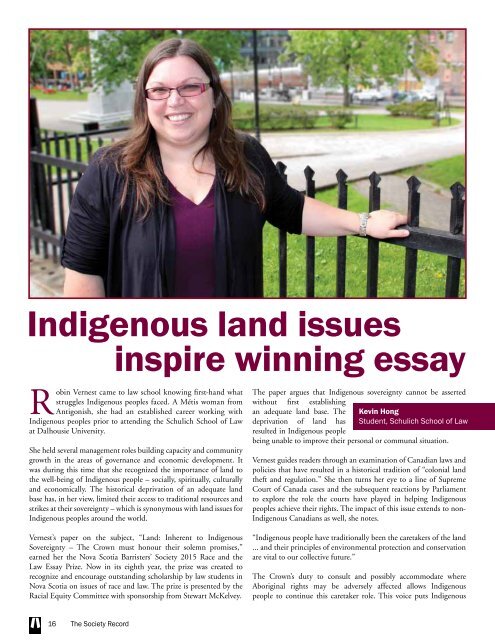Restoring Justice
1OTNXPx
1OTNXPx
Create successful ePaper yourself
Turn your PDF publications into a flip-book with our unique Google optimized e-Paper software.
Indigenous land issues<br />
inspire winning essay<br />
Robin Vernest came to law school knowing first-hand what<br />
struggles Indigenous peoples faced. A Métis woman from<br />
Antigonish, she had an established career working with<br />
Indigenous peoples prior to attending the Schulich School of Law<br />
at Dalhousie University.<br />
She held several management roles building capacity and community<br />
growth in the areas of governance and economic development. It<br />
was during this time that she recognized the importance of land to<br />
the well-being of Indigenous people – socially, spiritually, culturally<br />
and economically. The historical deprivation of an adequate land<br />
base has, in her view, limited their access to traditional resources and<br />
strikes at their sovereignty – which is synonymous with land issues for<br />
Indigenous peoples around the world.<br />
Vernest’s paper on the subject, “Land: Inherent to Indigenous<br />
Sovereignty – The Crown must honour their solemn promises,”<br />
earned her the Nova Scotia Barristers’ Society 2015 Race and the<br />
Law Essay Prize. Now in its eighth year, the prize was created to<br />
recognize and encourage outstanding scholarship by law students in<br />
Nova Scotia on issues of race and law. The prize is presented by the<br />
Racial Equity Committee with sponsorship from Stewart McKelvey.<br />
The paper argues that Indigenous sovereignty cannot be asserted<br />
without first establishing<br />
an adequate land base. The Kevin Hong<br />
deprivation of land has Student, Schulich School of Law<br />
resulted in Indigenous people<br />
being unable to improve their personal or communal situation.<br />
Vernest guides readers through an examination of Canadian laws and<br />
policies that have resulted in a historical tradition of “colonial land<br />
theft and regulation.” She then turns her eye to a line of Supreme<br />
Court of Canada cases and the subsequent reactions by Parliament<br />
to explore the role the courts have played in helping Indigenous<br />
peoples achieve their rights. The impact of this issue extends to non-<br />
Indigenous Canadians as well, she notes.<br />
“Indigenous people have traditionally been the caretakers of the land<br />
... and their principles of environmental protection and conservation<br />
are vital to our collective future.”<br />
The Crown’s duty to consult and possibly accommodate where<br />
Aboriginal rights may be adversely affected allows Indigenous<br />
people to continue this caretaker role. This voice puts Indigenous<br />
16<br />
The Society Record


